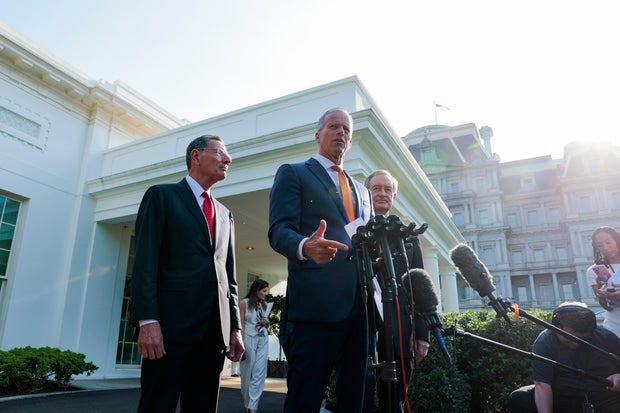Washington — The White House made a push for the centerpiece legislation of President Trump’s second term, hosting a “One, Big, Beautiful Event” on Thursday highlighting the bill amid intraparty disagreements and roadblocks in the Senate as lawmakers near a Fourth of July deadline.
After the House narrowly approved the legislation that addresses the president’s tax, defense, border and energy priorities last month, Senate GOP leaders are working to pass the bill in the upper chamber. The bill would then be sent back to the House to approve the changes before it can reach Mr. Trump’s desk for his signature. But the self-imposed July 4 deadline looms large over the effort, with key disagreements remaining.
With an array of working-class Americans standing behind him, from farmers to electrical workers, the president claimed the bill would lower Americans’ tax burdens, make permanent his first administration’s tax cuts and eliminate taxes on tips.
“This is the ultimate codification of our agenda to — very simply, a phrase that’s been used pretty well by me over the past 10 years, but maybe even before that — make America great again,” Mr. Trump said in the White House East Room.
He also called the legislation the “single-most important piece of border legislation ever to cross the floor of Congress,” pointing to the bill’s pledge to hire thousands of new border patrol and Immigration and Customs Enforcement agents. The president reiterated his administration’s goal of deporting at least 1 million undocumented immigrants every year.
It was Tom Homan, Mr. Trump’s border czar, who had the strongest words for Congress at the White House, saying he’s tired of meeting parents whose children have been killed by someone in the country illegally, or parents whose children have been killed by drugs brought into the country.
“What the hell is the matter with everybody up in Congress? People are dying every day. … Pass the bill so we can make this country safe.”
White House press secretary Karoline Leavitt met with House Republicans on the conservative Republican Study Committee on Wednesday and told reporters that the administration is working to “make sure everyone understands this bill needs to be back on the president’s desk by July 4.”
“The White House and the president have been consistently engaged in this process since the very beginning, both on the House side and on the Senate side,” Leavitt said, adding that Mr. Trump “is always willing to make calls, and we’re going to get this bill done.”
But as the deadline approaches, Republicans in Congress have squabbled over key provisions in the legislation, like Medicaid restrictions used to pay for the bill’s new spending.
Shortly before the president’s afternoon event, Treasury Secretary Scott Bessent said he’s asking Congress to remove a tax provision that targets dividends, royalties, interest and business profits earned by individuals and institutions abroad. Complying with Bessent’s request would make the legislation more expensive.
Senate Republicans have proposed steeper cuts to Medicaid funding in part by lowering provider taxes — which states use to help fund their share of Medicaid costs — from 6% to 3.5% by 2031. The House sought to lower federal costs by freezing states’ provider taxes at current rates and prohibiting them from establishing new provider taxes. The Senate’s move has sparked pushback, and threatened to complicate the delicate balance reached in the House.
Then on Thursday morning, Senate Democrats on the Budget Committee announced that the provider tax plan was among a handful of key provisions that the Senate’s rulekeeper had determined would violate what’s known as the Byrd Rule, which requires that the legislation only include provisions that have a direct impact on federal spending.
Anna Moneymaker/Getty Images
The parliamentarian’s rulings
Senate parliamentarian Elizabeth MacDonough has been examining the legislation to determine whether any provisions violate Senate rules. Any that are in violation are subject to a 60-vote threshold, rather than the simple majority required under the reconciliation process.
Senate Democrats said the parliamentarian also weighed in on a measure cutting federal funds to states that use Medicaid infrastructure to provide health care coverage to undocumented immigrants, along with banning Medicaid from covering gender transition services.
The announcement on the rulings came days after the parliamentarian determined that Republicans can’t include language that would make it harder to challenge the government’s actions in court, along with a section barring immigrants who are not citizens or lawful permanent residents from receiving food assistance benefits under the Supplemental Nutrition Assistance Program.
The parliamentarian also rejected a proposal that would have sold off millions of acres of public lands. She struck provisions regarding the sale of electric vehicles used by the U.S. Postal Service and several immigration-related measures, including limiting certain funding for “sanctuary cities” and allowing states to conduct border security and immigration enforcement.
Senate Republicans are working to bring some of the measures into compliance with the parliamentarian’s rulings; her deliberations on other parts of the legislation are ongoing.
GOP Sen. John Kennedy of Louisiana called the parliamentarian’s decision on the provider tax a “setback,” adding that Senate Republicans would decide whether to rewrite the details of the provision to comply with the Byrd Rule — or move forward without the provider tax.
The move sparked pushback among some congressional Republicans. Rep. Greg Steube, a Florida Republican, said Vice President JD Vance, the president of the Senate, should overrule the parliamentarian. And GOP Sen. Tommy Tuberville of Alabama said she should be fired.
Sen. Rick Scott, a Florida Republican, told reporters Thursday that the parliamentarian’s ruling was “pretty frustrating.” But he said he’s “optimistic that we can come up with ways to make sure we fulfill the Trump agenda and also have fiscal sanity.” And Sen. Lindsey Graham, a South Carolina Republican, said he expected the conference would try to retool the provision. Although he doesn’t agree with the ruling, Graham said he has “no intention of overruling her.”
Senate Majority Leader John Thune, who was asked about the possibility of overruling the parliamentarian earlier this month, said “we’re not going there.”
But Thune faced difficulties even before the rulekeeper’s decisions, as he worked to keep his conference together on the massive legislation. On Wednesday, he told reporters, “We’re working with all of our members to try to get people comfortable with the bill.”
With a 53-seat majority, Senate GOP leaders can afford to lose just three Republicans on the bill, with all Democrats expected to oppose.
Thune said earlier in the week that “when push comes to shove, you’re looking at whether or not you’re going to allow the perfect to become the enemy of the good.”
“You have to recognize that this is a process whereby everybody doesn’t get everything they want,” Thune said. “But I think we’ve produced a bill working with the House, working with the White House, that will get the requisite number of Republican senators to vote for it so that we can pass it.”
,
and
Nikole Killion
contributed to this report.
https://www.cbsnews.com/news/white-house-pushes-big-beautiful-bill-as-gop-faces-roadblocks-in-senate/



